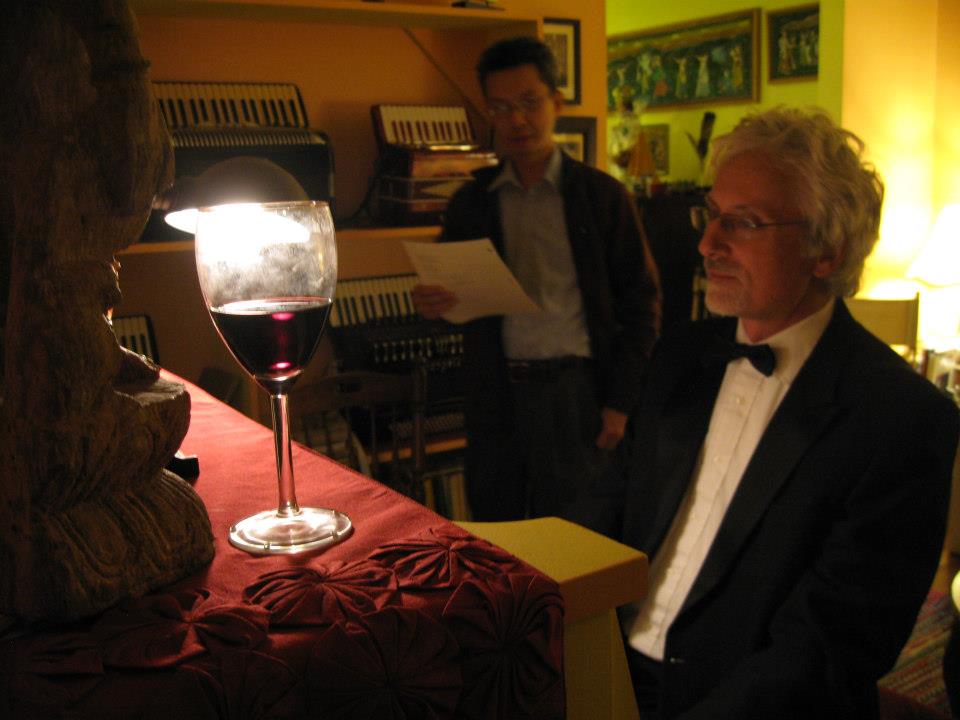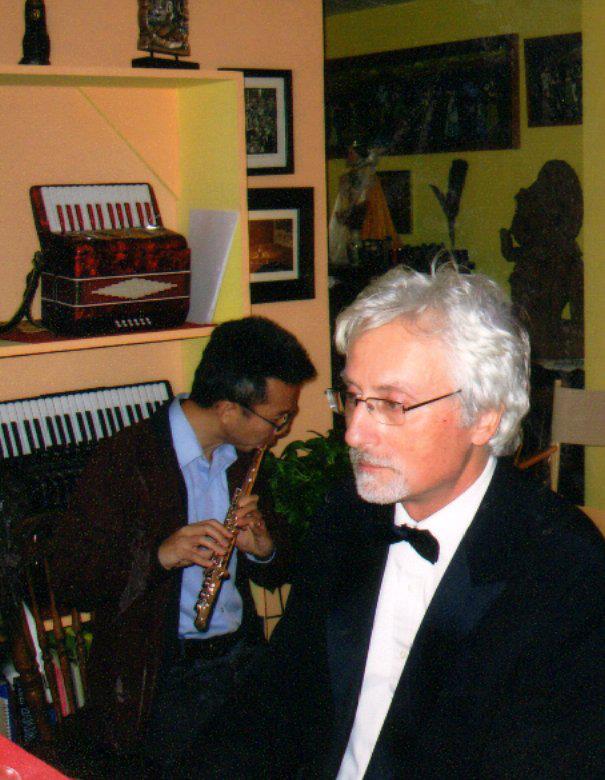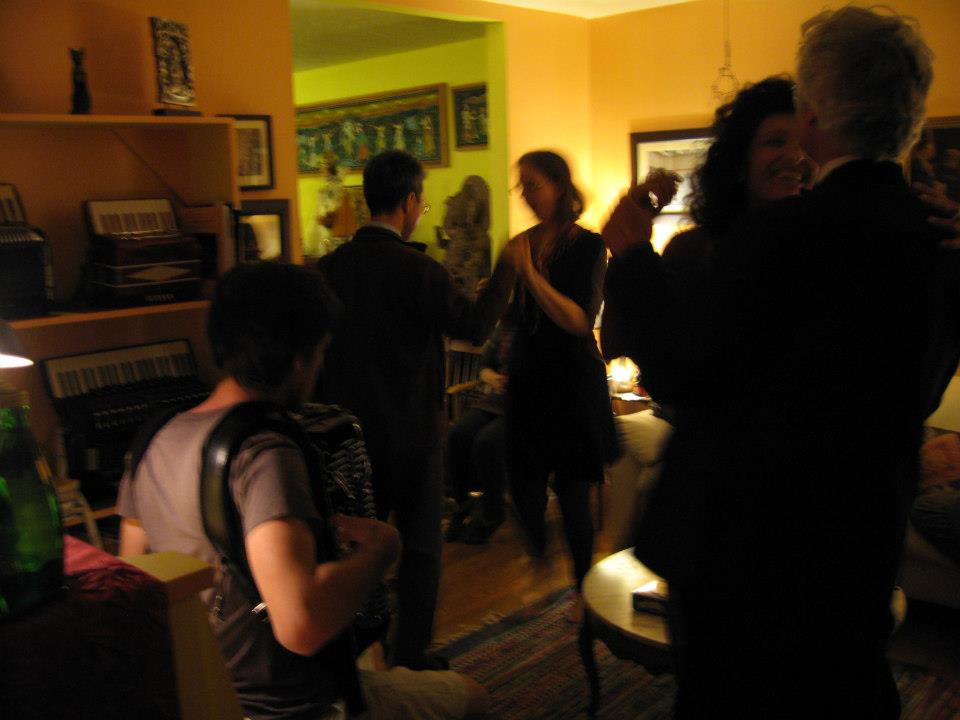A childhood dream come true: I am now finally singing for real!
Nov 17, 2012 · 8 minute read · 0 CommentsmusicsingingflutetangoboleroSabor a mîGabriel FauréAprès un rêveRobert SchumannWidmungCarlos GardelPor una cabeza
Abby and I went to a pre-Thanksgiving party hosted by Henry and yet again, I changed my life.
At the last party at Henry’s, two months ago, I had begun singing there for the first time, and afterwards vowed that I would take up singing for real.
I’d followed up very slowly, taking a month before actually singing in public, and then the day after that, continuing to sing in public at J-Jam.
It was the last event, J-Jam, that got me to decide to really prepare some songs to sing for the next J-Jam. What happened was that I had started off by trying to find some suitable flute/guitar music to work on with Cantor Ben Rosner for J-Jam, but I noticed that I was picking some material that was actually originally sung and then transcribed for flute. After being unsatisfied with playing these songs on flute, because I couldn’t get quite the expression I wanted, I bit the bullet: I decided that the voice is the original and best instrument we have, and that I should use the best instrument to achieve what I wanted to do, which was to maximize expressiveness in lyrical music. So I started looking for transpositions of songs to a suitable range for me in order for me to sing them.
Then when Henry’s party invitation came up, I jumped at the opportunity to try out some of the music I was preparing for J-Jam, to perform with Henry on piano.
What did I do?
One year anniversary of my deciding to sing
By coincidence, it’s almost exactly one year since I decided here on this blog that I was going to get into singing.
Music plan
I picked out four pieces to give Henry advance warning on, so that I could give him the piano parts for him to take a look at before the party. During the first round of the chess tournament we were both playing in, I gave him a big collection of music, not only for the upcoming party but for possible future projects also.
The selections I chose to work on for the party:
- Gabriel Fauré: Sicilienne (flute and piano)
- Gabriel Fauré: Après un rêve (voice and piano)
- Robert Schumann: Widmung (voice and piano)
- Carlos Gardel: Por una cabeza (voice and piano)
At the party
Food
Barbara rather than Anna took charge of providing the main food this time, while the rest of us pitched in with our contributions. There were over twenty people at this party, I believe.
I made my own very small contributions:
Cabbage with leeks and potatoes

Cabbage with leeks and potatoes
Cabbage with leeks and potatoes, with olive oil and butter and seasoning.
(Make sure to caramelize in the skillet.)
Turnips and carrots

Roasted turnips and carrots
Roasted turnips and carrots, with olive oil and seasoning.
Music
I unexpected ended up providing a lot of the music this evening. There were fewer people involved in playing music than in some of the other parties.
This time, I brought just my (modern) flute and my voice. I left my recorders and Baroque flute and Irish flute and tin whistle at home.
I started off with singing the tango “Por una cabeza” (made famous in “Scent of a Woman”), very hesitatingly:

Franklin's first try at Por una Cabeza
I was so nervous that my legs were shaking and my arms trembling as I began; it was exactly as what happened eight months ago at the first of Henry’s parties at which I played an instrument. The difference was that although that one time, I knew I was playing the flute badly, this time, I was confident that I was singing OK: not great yet, but not badly. I’d worked two weeks on singing.
Memory
One thing I have observed again and again during my past year of music is that it really is ideal to have stuff memorized. I have not put enough work into that, since with my limited time, I tend to use it on working on technique and on learning material, rather than on memorizing what I can play off a score or sing off a printed set of lyrics.
But I did make a special effort to memorize at least two of the songs I had prepared: the Fauré and the Schumann. I did manage to more or less memorize them in time, since the French and German vocabulary of these love songs were fairly straightforward (I studied French and German in high school and college). The tango in Spanish, “Por una cabeza”, I did not have hope of memorizing any time soon.
But I brought along printouts to help me so I could glance at them at least now and then. Obviously, I aim to become independent of these aids so that I can sing unencumbered by looking at a printout, and connect directly with the audience.
What it’s like to sing
The feeling of singing is like nothing else. It’s so physical in a primal way, compared to playing flute or recorder. I completely lose myself in emotion, when I can squeeze as much expression out of the voice as I can. It’s an amazing sensation. It’s a communication that is very direct.
Maybe if I played a violin I would feel something like that, because of the expressive qualities of the violin. On flute, I cannot do everything that I can do with my voice. I try, but it is not the same.
Flute
My focus on singing overshadowed the fact that I was actually making something of a debut on modern flute here. I had played modern flute in anyone’s presence outside the home only a handful of times before:
- for St. Patrick’s Day
- a Baroque jam session in March, playing a Baroque piece
- a Pittsburgh Recorder society potluck/recital, playing a pre-Classical piece
- J-Jam, where I did a bit of bossa nova improvisation
It’s not only because I was focusing on other instruments all year. It’s also because I’ve found it very challenging to make the kinds of sounds on the modern flute I want to hear. On each of those four occasions in which I played the modern flute, I felt that I needed to improve a lot.
I have improved a lot, actually, but I’m still far from satisfied; I’ve only now gotten to the point at which I feel I am not an embarrassment. Developing a truly beautiful, flexible tone seems a years-long task, and I keep working at it.
Anyway, I have finally jumped into the late 19th century, out of the 18th, to play Romantic music on the instrument that is suited for it, the modern flute:

Franklin playing Fauré, Sicilienne
Unexpected singing
Henry so enjoyed going through songs with me that he had me repeat “Por una cabeza” later in the party. I did, and I felt much more relaxed than when I did it the first time. I thought I did much better this time.
Then I thought, hey, I had given him a whole folder of stuff, so we should just sight read some of it. I ended up singing Schubert’s “Nacht und Traüme” as well as “An die Musik”, which I had intended for a later occasion.
Then, finally, before Abby and I had to leave, I decided that I wanted to sing a song especially for Abby, and pulled out Alvaro Carrillo’s “Sabor a mî”, which I know by heart (I will explain in a later blog post the significance of this song for me), and sang it to her, with Henry providing great accompaniment on first sight.
Dancing
Dancing with Abby at these parties is always a special pleasure for us… Vasili on accordion.

Abby and Franklin dancing waltz
Why did so few other people sing?
Some of the guests had been introduced to me as singers, yet none of them sang at the party! This was puzzling to me. There could be many reasons, but I won’t speculate.
As for those who expressed enjoyment of singing to themselves, but identified themselves as non-singers (as I did), that’s very easy to understand, because I was there myself. I’ve simply chosen to overcome my fear and anxiety, work on improvement, and then put myself out there, warts and all. I do this because I saw the younger people under 20 do this, and I decided that if being “old” means being afraid, I’d rather do what the younger people do, and just get out there.
What next?
I’m going to do serious study of singing. Henry mentioned a book “Singing for Dummies” that I’ll check out. I would like to work through it systematically.
By the way: I noticed that my flute and recorder playing have improved in several dimensions since I started working on singing. My breath awareness is better, my control over my breath stream, and even more than that, I’m really trying to treat my instruments as parts of my body, to get that integrated feel I have when just singing.
Conclusion
I’m singing now. There’s no going back. It’s like when I originally started dancing, after decades as a non-dancer, or started running, or started cooking, or started public speaking. There’s just no going back, after the first big step.